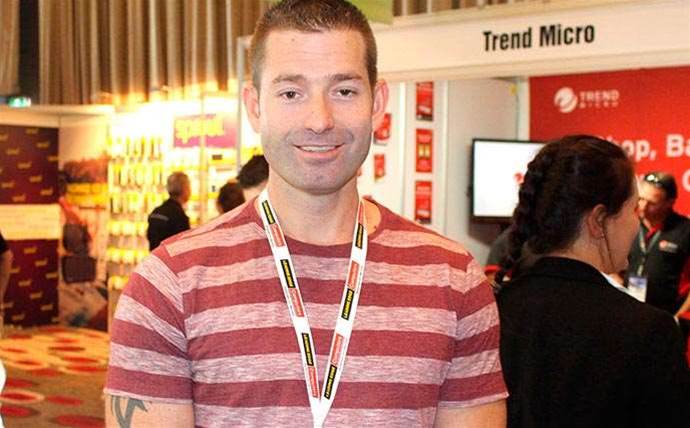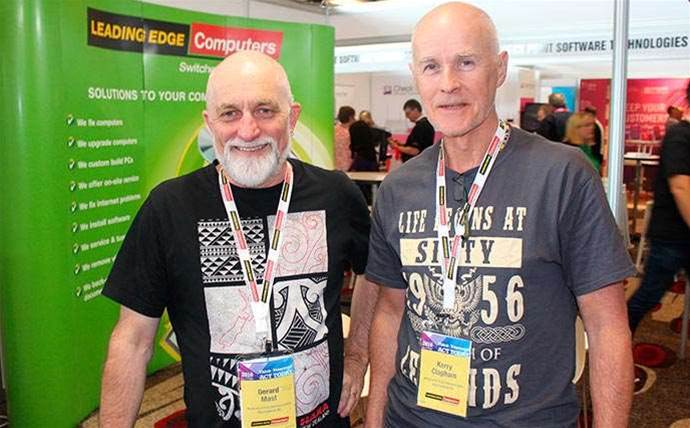A small band of Leading Edge Computers owners are shaking off the group’s reseller heritage to build enterprise IT services businesses more about data centres than consumer devices.
Some eight companies within LEC make up the Business Solutions Group (BSG), an initiative that has helped the national chain cement high-level partnerships with the likes of Cisco, Lenovo and VMware, as well as newer partnerships with Veeam and Webroot.
With eight members and another seven on track to join in 2016, LEC’s support office estimates that almost a quarter of the 132 Leading Edge stores could eventually join.
BSG represents a roadmap for members to evolve beyond hardware reselling. It’s a hard task for any reseller to compete with big-box retailers such as JB Hi-Fi and Harvey Norman. Just ask Dick Smith.
The BSG group was the brainchild of Guy Coble, the owner of two LEC stores – one in Port Macquarie, the other in the small central-west NSW town of Cowra.
BSG is a mechanism to recognise those companies within Leading Edge that possess skills such as deploying enterprise networks and providing managed services. It is also a way to accredit LEC companies based on specific benchmarks, notably a requirement for at least one Cisco Certified Network Associate (CCNA) and to have two staff that have passed a Microsoft certified solutions associate exam.
For Coble, the real move toward business-to-business IT services began after he acquired Port Macquarie in 2010. It started with a conscious decision to relocate.
“We moved from being in a retail area in the middle of the CBD – where everyone walks through the door and price-matches – to an industrial area. We did a really schmick refit of the premises, looking like an Apple store, gloss white interior, backlighting, spent a fortune doing it. All the products are business products, such as phone systems and networking hardware. Mac products are the only retail, but we consider that business because Apple is education.”
LEC store owners use their membership in the buying group as a platform to exchange ideas – and Coble found he was fielding constant questions about managed services and business IT. He took it to the support office in Sydney.
“I had been talking to them [LEC’s support office] for a while about the requirement for something away from the computer group. Retail had been struggling but we had been doing well, constantly being asked by members about managed services. With everyone trying to be an MSP, we needed to find a way to demonstrate there is a part of the [LEC] business that has these skills and to accredit that.”
Coble said there has been widespread interest from members. “A lot of people want to take that journey and aren’t sure how.”

Leading Edge's Guy Coble
This year marked the first time Leading Edge has invited a journalist to attend its annual trade show conference. When CRN caught up with Coble at the Melbourne event, he was in a room away from the trade show floor designing a complex, layer-2 enterprise network for a regional council. It will eventually see the council procure hundreds of thousands of dollars worth of Cisco networking gear, as well as IT services. The next project on the horizon for Coble will be setting up active-active data centres for the local authority.
Coble’s operation is not the mum-and-dad reseller business many associate with the Leading Edge brand. Stores like Coble’s, along with the likes of Intuit Technologies in Hobart and Computers West in Busselton, are spearheading the new enterprise focus within Leading Edge.
LEC’s shift from retail sales towards corporate IT began in 2007, when Graham Dear joined the group. Dear, who is now chief executive of Leading Edge Buying Groups, has been a change agent for transformation. The mission is also support by Lee Scott, general manager of LEC, who says Coble and other BSG members represent a new vision for Leading Edge Computers.
From their positions in the support office, Dear and Scott have used Leading Edge’s aggregated clout – estimated at roughly $300 million of combined turnover per year – to establish top-tier partnerships with Cisco and Lenovo. The Diamond partnership with Lenovo gives members access to pricing and support that individual small business resellers could never hope of securing.
While Scott concedes that the Business Solution Group will likely remain a minority of the broader LEC network, he hopes to see the number increase to as many as 30 stores. Today’s BSG members are “leading the way for all members to get there – providing the stepping stones”.
While there is some accuracy to Leading Edge’s reputation as small, mum-and-dad resellers, Scott reckons it is not entirely fair. He points out that 21 members turn over more than $1 million and about a dozen members turn over $5 million to $15 million.
Two owners who have watched LEC’s evolution are Kerry Clapham and Gerard Mast, business partners who own stores in Warrnambool, Portland and Hamilton in regional Victoria. The pair, who fell into Leading Edge through an acquisition in 2008, weren’t immediately sold on the value of being part of a group better known for high street computer sales than servers, storage and networking.
“We thought, this is not for us, too retail,” Clapham says. They weren’t alone in this perception. Mast explains how the company’s account with Ingram Micro was immediately shifted from commercial to the distributor’s retail arm. “All of sudden, we couldn’t buy HP servers,” adds Clapham.
That hiccup was resolved and the duo has witnessed a broader change – vendors have warmed to the idea of Leading Edge as a business IT services provider. “We happened to hit them just as they were evolving, as Graham Dear joined,” Clapham says. “He brought a more business focus to the group. We have credibility now. You used to hear, ‘You’re with Leading Edge, you just sell boxes’.”

Gerard Mast and Kerry Clapham
At this year’s LEC conference a host of new trade show exhibitors were evidence of the group’s transition. First-time exhibitors such as Veeam, Webroot, Xero and Alloys are offering a new product mix. Alloys, for instance, was demonstrating 3D print from MakerBot and IP surveillance gear from ACTi.
CRN also caught up with Paul Townsend from SQL Services, a division of Dimension Data. SQL Services is offering its expertise to support Leading Edge resellers with the kind of sophisticated skills around Microsoft and Oracle databases that are unlikely to be in abundance among regional resellers. It’s another example of the enterprise flavour to this year’s LEC conference.
At the centre of the trade show floor, CRN met with startup Australian Cloud Solutions, which recently signed a deal to supply its infrastructure-as-a-service exclusively to LEC members. One of the cloud provider’s two directors, Keith Poole, grew up around the LEC network, cutting his teeth at the Busselton store in Western Australia before setting up ACS with Tristan Hammat last year.
They struck the exclusivity arrangement with Leading Edge after meeting Lee Scott, who was looking for an IaaS offering for members to support use cases such as hosted Exchange, remote desktops environments and backup and DR.
The pair, both technical by trade, reckon ACS has a place in the highly crowded and competitive world of IaaS, a sector dominated by Amazon Web Services and Microsoft Azure, as well as Rackspace and local player Zettagrid. Poole says the platform’s “easy, clean UI” makes it a better fit than AWS or Azure for the less-technical members of the Leading Edge family. It is priced to allow a double-digit markup, something the hyperscale providers don’t offer.
Poole is visibly proud of the architecture beneath the platform, which is hosted at Equinix Sydney. Rather than running separate compute and storage networks cabled together, the ACS platform “is designed similarly to how the old super-computing clusters used to work in a mainframe-style architecture”, Poole says. “All the hosts have storage built into them, so you have the benefit of extremely fast local storage – there is no bottleneck. Then the physical hosts are connected to a central switched fabric with dual 40-gigabit InfiniBand – faster than the disks can be accessed.”
Everything is replicated “in real time to at least one other host”, which ensures redundancy.

The enterprise-skewed cloud platform is a strong example of the changing product mix within Leading Edge Computers; a transition that’s a microcosm of the broader shift well underway in global IT channel.
But not everyone will make the shift. Scott reckon up to 30 Leading Edge members could ultimately join Business Solutions Group, around a quarter of the current 132 members.
One of the best examples of an enterprise IT provider within Leading Edge is Intuit Technologies, the largest player in the group with 90 staff across Hobart, Launceston, Melbourne and Brisbane. As an enterprise IT integrator with a foothold in state government, Intuit doesn’t look the typical Leading Edge member. Owner Pieter Kolkert is more concerned with beating the likes of Data#3 in a Tasmania Government tender than worrying about consumers price-matching against JB Hi-Fi.
He admits LEC’s reputation as small regional resellers can work against Intuit. “Whenever I talk to a vendor, they look at me like, ‘What?’ And they automatically pigeonhole us.”
Kolkert says his company offers as much back to the group as it gets out of being a member. “A lot of people ask me, why are you in Leading Edge at all, given the scale we are these days. It is a valid question – I can form all the same relationships. In fact, we even have some better relationships than Leading Edge can. So why are we in it? I guess we feel we can add value to them as an organisation and they also bring value to us.”
He calls out the Lenovo Diamond status as an example of getting value from membership: “I get access to Diamond pricing and rebates that I wouldn’t get otherwise – there are still benefits in it for me.”
Kolkert is another member of the Business Solutions Group. “They are the ones who want to go into the enterprise. They have worked out that there is more to the world than selling an Apple iPad to a schoolkid.”
For many store owners, especially those in small regional towns, BSG membership will never be relevant. The demographics are changing though. One of the main reasons Leading Edge loses a member is upon retirement. Recruiting new owners is a major priority for the support office, and star performers like Intuit and Guy Coble’s Port Macquarie operation are essential for attracting the next generation.
“Guy is reflective of where Leading Edge will have to be in the future,” Kolkert says.
Fact File: Leading Edge Computers
- Support office Sydney
- Members 132
- Key personnel Lee Scott (GM of Leading Edge Computers), Graham Dear (CEO of Leading Edge Buying Groups)
- Established 1995
- Key vendor partnerships HP Premier, Lenovo Diamond, Cisco, Microsoft, VMware





.jpg&h=142&w=230&c=1&s=1)

.png&h=142&w=230&c=1&s=1)
_(21).jpg&h=142&w=230&c=1&s=1)




.jpg&w=100&c=1&s=0)







_(1).jpg&q=95&h=298&w=480&c=1&s=1)



